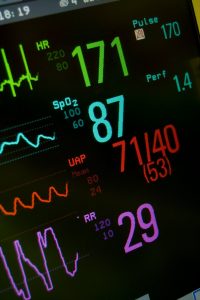Walk into almost any hospital emergency room or intensive care unit – and what do you hear? There is the almost constant whoosh-and-honk of the ventilator. There might be an infusion pump, beeping in a high-pitch tone every six seconds or so. Blood pressure monitors will let out one single long tone after another. All these medical devices contribute to something we as medical malpractice attorneys recognize as “alarm fatigue.” 
Although all of these monitors have their purpose, most of the time they don’t require any action. When medical professionals (nurses, in particular) grow accustomed to this constant din of noise – sometimes several hundred alarms daily – they can grow desensitized to it. Others, to avoid becoming overwhelmed, may turn the volume down. Some might simply ignore them. This could have serious and possibly deadly consequences to patients.
Patient safety advocates and medical malpractice attorneys have been raising concern about this issue for many years. However, it’s become an increasingly more pressing problem as technology evolves and the medical device community emerges with an increasing number of complex, loud machines – all intended to save lives, but contributing to this alarm fatigue issue.
One analysis published in the journal AACN Advanced Critical Care in 2013 revealed somewhere between 72 percent to 99 percent of clinical alarms are false. This is a significant problem that can lead to alarm fatigue – which is known to have contributed to patient deaths.
Also that year, the Washington Post reported on a $6 million medical malpractice wrongful death award after a 17-year-old girl died the year before following what should have been a routine tonsillectomy at a surgery center. The high school junior was given a powerful painkiller. It slowed her breathing. However, a nurse didn’t check on her for a full 25 minutes because the respiratory monitor to which she was attached was muted. When the nurse did finally come to check on her, she’d suffered severe and permanent brain damage. She died two weeks later.
After her death, the surgery center announced it would adopt policy to no longer allow alarms to be muted.
The death of another child a decade earlier in a similar incident prompted the Children’s National Medical Center to begin routine audits of alarm response times. They opined nurses and other clinicians were hearing alarms ever 66 seconds in the NICU. The center now allows custom device settings for each patient.
There are three basic functions of alarms in hospital settings: To monitor changes in a person’s heart rhythm, to monitor vital signs (including breathing) and technical quality alarms (i.e., low battery, medication complete, etc.). These are all important notifications, but it does little good if healthcare providers are tuning them out or turning them off.
The AACN researchers recommended adopting changes such as procedures to ensure proper skin prep before placing alarms, changes to electrocardiogram electrode devices, better education of nurses and other staff on the issue and specific parameters about which alarms can be muted and when.
The journal American Nurse Today examined this issue as well, identifying some of the factors that commonly lead to alarm fatigue as:
- Parameter of alarm thresholds set too tight;
- Alarm not adjusted to needs of individual patient;
- Inability of staff to hear alarms or determine where its coming from;
- Frequency of false signals;
- Inadequate training of staff on alarms and monitors;
- Malfunctioning alarms.
If you believe a loved one suffered personal injury or wrongful death due to failure to respond to a medical device alarm, our South Florida medical malpractice attorneys can help you review the facts of what happened to determine if alarm fatigue contributed to the incident. If so, you may have grounds for a medical malpractice lawsuit.
Contact the South Florida medical malpractice attorneys at Halberg & Fogg PLLC., Attorneys at Law, by calling toll-free at 1-877-425-2374. Serving West Palm Beach, Miami, Tampa, Orlando and Fort Myers/ Naples. There is no fee unless you win.
Additional Resources:
Do you hear what I hear? Combating alarm fatigue, Nov. 2014, American Nurse Today
More Blog Entries:
Florida Supreme Court Draws a Line on Medical Malpractice v. Negligence, May 7, 2018, West Palm Beach Medical Malpractice Attorney Blog
 South Florida Injury Lawyer Blog
South Florida Injury Lawyer Blog

